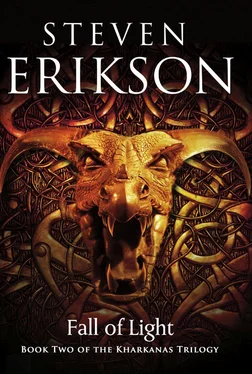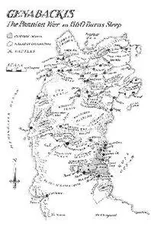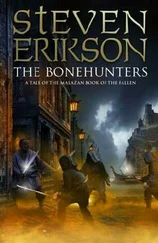Steven Erikson - Fall of Light
Здесь есть возможность читать онлайн «Steven Erikson - Fall of Light» весь текст электронной книги совершенно бесплатно (целиком полную версию без сокращений). В некоторых случаях можно слушать аудио, скачать через торрент в формате fb2 и присутствует краткое содержание. Год выпуска: 2016, Издательство: Tom Doherty Associates, Жанр: Фэнтези, на английском языке. Описание произведения, (предисловие) а так же отзывы посетителей доступны на портале библиотеки ЛибКат.
- Название:Fall of Light
- Автор:
- Издательство:Tom Doherty Associates
- Жанр:
- Год:2016
- ISBN:нет данных
- Рейтинг книги:3 / 5. Голосов: 1
-
Избранное:Добавить в избранное
- Отзывы:
-
Ваша оценка:
- 60
- 1
- 2
- 3
- 4
- 5
Fall of Light: краткое содержание, описание и аннотация
Предлагаем к чтению аннотацию, описание, краткое содержание или предисловие (зависит от того, что написал сам автор книги «Fall of Light»). Если вы не нашли необходимую информацию о книге — напишите в комментариях, мы постараемся отыскать её.
Fall of Light — читать онлайн бесплатно полную книгу (весь текст) целиком
Ниже представлен текст книги, разбитый по страницам. Система сохранения места последней прочитанной страницы, позволяет с удобством читать онлайн бесплатно книгу «Fall of Light», без необходимости каждый раз заново искать на чём Вы остановились. Поставьте закладку, и сможете в любой момент перейти на страницу, на которой закончили чтение.
Интервал:
Закладка:
He heard the solid chop of the sword blade, a moment’s worth of choked sob, and then the man’s body falling along with his head. Fingers playing on the ear of the wine jug, he listened as both offending objects were dragged away.
A soldier then spoke. ‘It is done, sir.’
Hunn Raal opened his eyes, blinking in the bright glare, and saw that it was so. He waved his soldiers away. ‘Leave me now, to my grief, and make a list of heroes. It has been a dark day, but I will see light born of it nonetheless.’
Overhead, the winter sun offered little heat. The cold air invited sobriety, but he was having none of that. He’d earned his right to grieve.
* * *
Renarr watched the other whores moving among the corpses below, and the children running this way and that, their thin cries drifting up as they found a precious ring or torc, or a small bag full of coins or polished river pebbles. The light was fading as the short day hurried to its close.
She was chilled to the bone, and not yet ready to think of the boldness of the men who would find her in the evening to come, but her imagination defied such aversion. They would taste different – she was sure – but not on the tongue. This would be a deeper change, something to absorb from sweat and from what they leaked in their passion. It was a taste she would glean wherever their flesh met. She could not yet know, of course, but she did not think it would be bitter, or sour. There would be relief, and perhaps something of the despondent, in that intimate flavour. If it burned, it would burn with life.
She caught sight of the girl whose killing had started the day. She walked with followers now, regal as a queen among the dead.
Renarr studied her, and did not blink.
* * *
You could find a kind of justice in Urusander’s fate, although I will grant you, his ascension to the title of Father of Light made justice a mockery. So yes, indulge me now and give this blind old man a moment or two to catch his breath. This tale has far to go, after all. Free me to muse on the notions of righteous consequence, since they lie scattered before us like stepping stones across history’s torrent.
I have no doubt Urusander was no different from you or me, or rather, no different from most thinking creatures. For myself, I make no common claim. The poet’s view of justice is a secret one, and you and I need not discuss its rules. A few deft twitches on the fingers of one hand bind us in hidden kinship, with strangers none the wiser. So I am certain that you too will hold back when I speak of Urusander’s similitude.
To be plain, he saw justice as a clear thing, and from that raging river of progress, which ever tugs us along, he longed to dip a hand in at any point and raise to the heavens a pool of clean water, sparkling in the cup of his palm.
We look upon this same torrent and see the silts of flood waters, of banks breached, and islands of detritus crowded with shivering refugees. To steal a palm’s worth is to look down upon a cloudy, impenetrable world, a microcosm of history’s messy truth. And in the anguish and despair with which we contend, upon observing our dubious prize, we can hardly call our vision a virtue.
Virtue. Surely, of all words that might belong to Lord Vatha Urusander, it is that one. Such clear justice, in hand as it were, must indeed be a worthy virtue. So, Urusander was a man who longed to cleanse the waters of history, through the sluice of hard judgement. Must we fault him in that noble desire?
There is that old saying, couched as a truism, and to utter it is to assert its primacy: justice, we say, is blind. By this we mean that its rules defy all the seeming privileges of the wealthy and the highborn. Laudable, without question, if from the rules of justice we are to fashion a civilization worthy of being deemed decent and righteous. Even children can be stung in the face of what they perceive to be unfair. Unless, of course, they are the ones profiting from it. And in that moment of comprehension, of unfairness to the other also being a reward to oneself, that child faces – for the first but not the last time – the inner war we all know so well, between selfish desire and the common good. Between injustice, clutched so possessively deep in the soul, and a justice that now, suddenly, stands outside that child, like a stern foe.
With luck, the regard of others will force submission upon the child, in the name of fairness, but make no mistake, it is indeed forced. Wrenched from small hands, and then indifferent to the child’s raging impotence. Thus in our childhoods we learn the lessons of strength and weakness, and violence delivered in the name of justice. We deem this maturity.
Father Light. Such a bold title. Sire to the Tiste Liosan, observing all of his children from a place of clear, unopposed light. A place of purity, then, eternal bane to darkness. A father to lead us into history. The god of justice.
Of course he adored the Forulkan, barring those hundreds who slid lifeless down the blade of his sword. After all, their worship of justice was intransigent in the virtue of its purity. As unassailable, whispers this poet, as a blind man’s darkness. But then, we poets suffer our imperfections, do we not? We are seen, in our seeming equivocations and indecision, as weak of spirit. Gods help a kingdom ruled by a poet!
What? No, I do not know King Tehol the Only. Will you interrupt me again?
So. I sense you manning still the ramparts of your admiration for the Son of Darkness. Will I never scour that romance from your vision? Must I beat you about the head with his flaws, his errors in judgement, his obstinacy?
You are eager for the tale. No patience left for an old man trying to make a point.
Kadaspala etched his god, in the end. Did you know that? He etched that god into life, and then, appalled at the long-awaited perfection of his talent, he killed them both.
What are we to make of that?
No matter. We have already seen Kadaspala find the promise of peace, delivered by his own hands, in a time of unbearable grief. The visionary is the first to be blinded, if a civilization is to fall. Set him aside. He is no longer relevant. Leave him to his small chamber in the Citadel, muttering his madness. His work is done. No, another artist must be dragged to the fore. Another sacrifice necessary to advance a people’s suicide.
In this tale, then, look to the sculptor’s hands …
… as he carves his monument. I leave the choosing of its title to you, my friend. But not yet. Hear the tale first. There is only so much we can indulge, before the chorus grows restless, and gives voice to its displeasure.
I am known to flirt with impatience? Now, surely, that is an unjust accusation.
TWO
Barely a smudge against the gloom, the sun was fading in the sky over the city of Kharkanas. The two lieutenants from the Houseblades of Lord Anomander, Prazek and Dathenar, met on the outer bridge and stood leaning on one of its walls, forearms on the stone. Like children, their upper bodies were tilted forward as they looked down upon the waters of the Dorssan Ryl. To their right, the Citadel stood like a fortress of night, defying the day. To the left, the city’s jumbled buildings crowded up against the flood wall as if caught in the act of marching over the edge.
Below the two men, the river’s surface was black, twisting with thick currents. Even now, the occasional charred tree trunk slid past, like the swollen limb of a dismembered giant. Ash-grey mud crusted the sheer walls that made up the banks. The boats moored to iron rings in the walls, near the stone steps that reached down into the water at intervals, looked neglected, home to dead leaves and murky pools of rainwater.
Читать дальшеИнтервал:
Закладка:
Похожие книги на «Fall of Light»
Представляем Вашему вниманию похожие книги на «Fall of Light» списком для выбора. Мы отобрали схожую по названию и смыслу литературу в надежде предоставить читателям больше вариантов отыскать новые, интересные, ещё непрочитанные произведения.
Обсуждение, отзывы о книге «Fall of Light» и просто собственные мнения читателей. Оставьте ваши комментарии, напишите, что Вы думаете о произведении, его смысле или главных героях. Укажите что конкретно понравилось, а что нет, и почему Вы так считаете.












